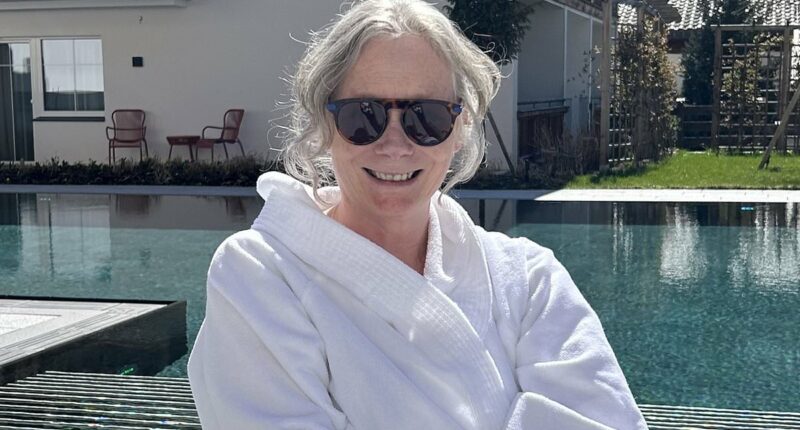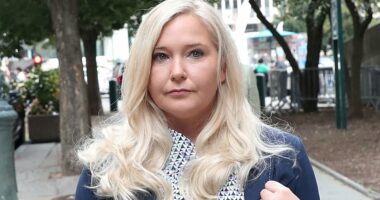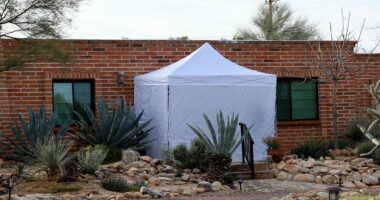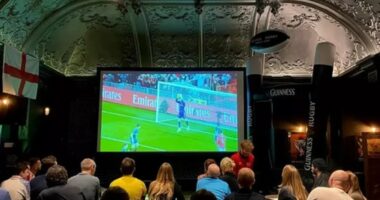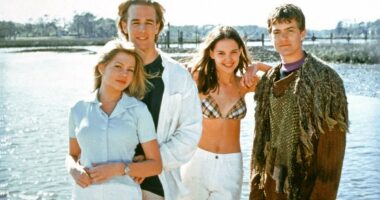Share this @internewscast.com
At 65 years old, I’ve reached a breaking point. I’m utterly tired of bizarre diets, and I’m beyond frustrated with being constantly hungry. On top of that, I’m still battling with my weight.
It’s not only about my appearance—my doctor has emphasized the necessity for me to reduce the visceral fat, which is the dangerous fat surrounding my organs that can harm my health.
I can’t take Mounjaro (thanks to my history of gallstones) and I’ve tried everything else, almost literally.
I’ve tried everything from ayurvedic panchakarma, which involves consuming liquid ghee (as unpleasant as it sounds), to numerous Mayr cures (an Austrian detox popular among celebs like Liz Hurley and Naomi Campbell) that involve munching on stale spelt rolls and sipping your malt ‘coffee’ with a teaspoon.
Memorable attempts include the week I only ate green food, and the one where I ended up with arrhythmia from too much exercise and not enough calories.
So colour me sceptical of any new plan. Indeed, when I first heard about the Mylife Changer® Method at the fancy new medispa, Mount Med, in the Tyrolean Alps (mountmedresort.com), I rolled my eyes and heaved a sigh.
Yet on closer inspection, this one did seem to have more substance. The six-week-long method was originally designed by Dr Alexander Papp, an aesthetics and reconstructive surgeon, to improve postoperative recovery for cancer patients.
However, he soon realised its benefits reached much further: people lost weight, improved their health and were even turning back the clock on their biological age. I packed my bags and headed to Innsbruck.

Jane Alexander has tried many diets, including a memorable week when she only ate green food, and another where she ended up with arrhythmia from too much exercise and not enough calories
‘Losing weight is tough,’ says Dr Papp as we sit down for my first consultation. ‘I get it, because I’ve been there.’
It turns out he went through his own weight loss journey in his 20s. ‘I went up to 115kg (just over 18st) during my time at university and during my first years as a doctor,’ he says. Then he changed his diet.
‘I started eating low carb, low fat and a normal amount of protein and I started exercising twice a week,’ he says. ‘It worked.’
It certainly did – he’s enviably slim and clearly fit as a fiddle. ‘Honestly, if I can do it, so can you,’ he promises.
I’m still not convinced – men seem to be able to lose weight far more easily than women (and particularly post-menopausal women like me). Also, how does this diet differ from anything else out there?
‘It’s unique because it combines the benefits of intermittent fasting, calorie restriction and the ketogenic diet,’ Dr Papp insists.
He explains that, unlike the popular keto diet (high fat, high protein), this is low fat with normal amounts of protein. What you do is eat five small portions of protein over a 12-hour period each day and then fast for the other 12.
Effectively, you’re eating five meals a day, which strikes me as a promising idea to tackle the hunger of dieting – but also too much food, surely, to lose weight?
Dr Papp assures me it’s not. ‘This way of eating helps to prevent fermentation in the gut which causes inflammation,’ he explains.
‘It keeps you full, stabilises blood sugar levels, and promotes fat loss. It is also more sustainable and beneficial for long-term metabolic health and longevity.’

Mount Med Resort in the Tyrolean Alps where Jane tried the Mylife Changer® Method
The method has been clinically tested on more than 4,000 people, and a recently published study in the journal Nutrients confirmed its effectiveness in reducing weight in obese patients preparing for bariatric surgery.
‘Participants lost an average of 7.8kg (a whopping 17lb) within four weeks, primarily from fat mass,’ says Dr Papp.
The intensive phase of the plan can last up to two weeks. Carbohydrates are slashed and calories reduced to around 1,000 per day.
During the first three to five days of eating this way, the body runs out of readily available carbohydrate stores, paving the way for a metabolic shift to ketosis, where you burn stored fat.
So far, so keto, and yet: ‘This plan is much lower in fat than the classic keto diet,’ insists Dr Papp. ‘It’s also not a long-term diet. We re-introduce carbs within a few weeks.’
In addition, the precise distribution of protein throughout the day preserves lean muscle mass (one of the main criticisms of keto – and indeed of weight-loss jabs – is that it can cause our bodies to chomp on muscle as well as fat).
While I’m at the resort, I find it incredibly easy to follow. The meals are small but delicious and wholly satisfying.
Breakfast comes in two stages – a bento box (with sprouts, cucumber batons, gluten-free biscuits and a portion of smoked salmon or ham) followed by an omelette.
To my intense delight, we’re allowed coffee.
Mid-morning we help ourselves to a protein shake. Lunch is broth, a help-yourself salad from the buffet (very green with olive oil and vinegar dressing and a sprinkle of nuts), and a main course of fish or meat (or a vegetarian option).

The six-week-long method was originally designed by Dr Alexander Papp, an aesthetics and reconstructive surgeon, to improve postoperative recovery for cancer patients
Mid-afternoon is one or two protein cookies (a bit hard and bland), while dinner is a starter (grilled octopus, crab salad, tiny rolls of chicken), broth and salad (as for lunch) and a main course of protein with sublime sauces and vegetable accompaniments.
Salmon on vegetable risotto, for example, braised veal cheeks on cauliflower cream, or entrecote steak with jus and vegetable strips.
I’m really not hungry and am tempted to skip the cookies and shake – which count as ‘meals’ – but am told not to by Dr Papp since they contain additional micronutrients: all the essential amino acids, 2g of collagen peptides (to support joints and connective tissue), as well as water-soluble fibre (which helps you feel full.
What I do miss is carbohydrate –my all-time comfort food is toast – and dairy.
‘Dairy often contributes to inflammation,’ warns Dr Papp. ‘Lots of people have sensitivity to lactose or casein. Even yoghurt is not good for the gut.
‘So we completely exclude dairy in the initial phase to allow the gut to re-set and reduce any hidden inflammatory triggers.
‘Later on, our patients are allowed to eat 30-month aged cheese – ideally goat or sheep which are more easily digested.’
I am eating so much I honestly don’t think I’ll lose weight. I haven’t even done that much exercise (just a few leisurely laps of the pool) so I am stunned when, on my last day, I have lost over 6lb in a week.
Even more surprising is that my biological age – based on cardio-respiratory fitness, fat-burning efficiency and metabolic rate – has decreased by five years. Dr Papp explains that’s mainly because of my weight loss.
‘Excess weight accelerates biological ageing by promoting chronic inflammation, oxidative stress, and hormonal imbalances,’ he warns. ‘There’s a clear link: the closer your weight is to your optimal range, the younger your biological profile tends to be.’
I feel so much better, too. I have more energy, am sleeping better, the aches from my rheumatism have subsided and my nasal congestion has cleared entirely.
But this is a six-week plan and I still have five to go – and I won’t be spending them at the spa with a chef to measure calories precisely. Can I ignore the temptation of the toaster and keep up the good work at home?
Week One net weight loss: 6.9lb

Breakfast is straightforward – even Jane can rustle up an omelette with spinach and mushrooms
Week Two
Well, it’s instantly harder, especially when you work full-time and loathe cooking.
Breakfast is straightforward – even I can rustle up an omelette with spinach and mushrooms – but I don’t have the time to cook the exquisite morsels of protein Mount Med serve up for lunch and dinner.
Instead, I opt for ready-cooked chicken and salmon and stock up on the kind of green salad I ate in Austria. I also shove some veg in the air fryer.
The snacks are more problematic. The system has its own proprietary shakes and snacks, perfectly calibrated to provide everything you need, but they’re expensive and I figure I’ll muddle along on my own.
I buy a good-quality protein powder from the health shop and crack on with that once (and sometimes twice) a day.
At the end of the week, I think I’ve done pretty well – but when I weigh myself I’ve put on 2lb.
Looking back at the photos I’d taken of my meals in Austria, I realise the problem is size. I am probably eating twice as much at lunch and dinner.
‘Portion creep is very common!’ says Dr Papp when I wail at him over email. ‘It’s often subconscious – our eyes and habits adjust to larger servings over time. That’s why we say to eat five small meals a day, even if you’re not hungry.
‘This prevents excessive hunger and consequently overindulging in large portions.
‘You also shouldn’t go to the supermarket when you’re hungry – you’re likely to buy too much food.’ Noted.
Net weight loss: 4.7lb
Week Three
Technically, I’m now at the point where I should be upping my calorie intake but still losing weight (everyone’s will vary; Mount Med has worked out my personal level at this point is 1,170 calories a day) and increasing carbs. But I’ve already veered off piste so I need to get back on track with a re-set.

Broth is a regular on the lunchtime menu
I start cutting my portions back – and though a snippet of Aldi chicken on a pile of salad doesn’t have the same allure as the gorgeously pimped and preened duck or venison at Mount Med, I think I am doing well.
Then real life kicks in. My dog Dan collapses and is diagnosed with vestibular disease (a condition that affects balance). He won’t eat and I have to drizzle water into his mouth with a turkey baster. It’s touch and go (he’s 15 and the vet isn’t hopeful).
My own diet is the last thing on my mind and I find myself scarfing bread slathered with butter. My inner critic is yelling (that I have no willpower; that I deserve to be fat) but Dr Papp is a steadying voice of reason.
‘Emotional eating is incredibly common – it’s a coping mechanism,’ he soothes. ‘The key is to recognise the trigger moments and develop alternative strategies: a brisk walk, journalling or even just pausing to breathe deeply before you reach for food.’
I could strangle him at this point – has anyone ever stopped and thought, ‘I will journal rather than eat the toast?’
Sure enough I put on another pound by the end of the week. I’m surprised it isn’t more.
Net weight loss: 3.8lb
Week Four
Dan turned a corner and started eating again – but will only countenance sausages (oh the irony!). I ditch the bread but by now am relying on my protein shakes to save time cooking.
I have been in denial about this part of my modified diet and, when I look at the ingredients, realise I’ve been taking in a lot of sugar and sweeteners. Sugar is pure catnip to me. I know I have a sugar addiction (yes, it’s a real thing) and I’m not doing myself any favours having a dose or two of ultra-processed food every day. My joint pain has returned, which I’m sure isn’t a coincidence.
‘Food addiction – especially to sugar and processed carbs – is more common than we think,’ says Dr Papp. ‘It hijacks the brain’s reward system [just as drugs like cocaine and heroin do].’
His advice is simple: ‘If you don’t buy it, you can’t eat it.’
But by the end of the week, I’ve put on weight again.
Net weight loss: 1.2lb
Week Five
The scales don’t lie. Once again, I have tried to follow a diet and ended up pretty much back where I began. The difference is that, this time, I can easily see where I went wrong and I haven’t thrown in the towel.
Life (children, work, partners, pets) gets in the way of most good intentions and if you have been programmed since childhood to equate food with reward, comfort or love, it’s tough to unpick.
Portion creep is real but for me, replacing meals with shakes was my major mistake. They’re very sweet which triggered my sugar cravings and, before I knew it, I was having several a day, in addition to my meals. So they had to go. With Dan on the mend, I got back to going to the gym four times a week.
Net weight loss: 2.4lb
Week Six and beyond
I’m back on track. Because of my blips I kept on the plan for an extra two weeks and after eight weeks I have lost 9lb in total. Not as much as I’d hoped, but it’s heading in the right direction. I’m not returning to my previous self-sabotage, so hopefully the pounds will continue to slip away.
The lesson is not to give up after mishaps. Diets aren’t a quick fix – they’re the start of a long slow slog to better habits.
I do think the Mount Med programme is sound (though I don’t like the reliance on the brand’s expensive processed snacks and have swapped those out moving forwards).
Net weight loss: 9.2lb

The scales don’t lie. Once again, Jane tried to follow a diet and ended up pretty much back where she began. The difference is that, this time, she can easily see where I went wrong and doesn’t thrown in the towel
Secrets of the super spa diet
(Ideally eat within a 12-hour window.)
Breakfast: Two eggs (boiled, fried, poached, or an omelette). A slice of smoked salmon or good quality cured meat. Spinach, mushrooms, sprouts. 1-2 cups of black tea or coffee.
Morning snack: Two wafer thin slices of cooked turkey/chicken/smoked salmon. OR a small portion of almonds and/or walnuts. OR one hard-boiled egg.
Lunch: Vegetable or beef broth. Salad (keep it green for the first two weeks and add in grilled green vegetables and mushrooms).
Use a home-made dressing of extra virgin cold-pressed olive oil with cider vinegar, salt and pepper. A small portion of protein (ie, lamb chop, small steak, seared tuna, grilled fish or chicken, grilled tofu, handful of prawns or other seafood).
Afternoon snack: As for morning.
Dinner: Vegetable or beef broth and salad (as for lunch). Small portion of protein (as for lunch).
Note: The plan should be followed for a maximum of two weeks. After that you can introduce a little more carbohydrate (root veg, pasta or rice) Keep portions small and avoid inflammatory foods (such as ultra-processed foods and most dairy).
Generally, this programme is safe for most people however if you have any medical condition, are on medications, pregnant or breastfeeding, consult your doctor.
